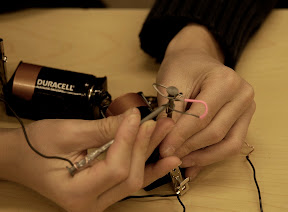What is the Montessori Method?
Montessori is a philosophy and method of education which emphasizes the potential of the child and which develops this potential by utilizing specially trained teachers (referred to as Guides) and specially designed teaching materials.
Montessori recognizes in each child a natural curiosity and desire to learn: the Montessori materials awaken this desire and channel this curiosity into a learning experience which each child can enjoy. Montessori materials help the child to better understand what they learn by associating an abstract concept with a concrete sensorial experience. In this manner, the Montessori child is actually learning, and not simply memorizing. The Montessori Method stresses that the child learns and progresses at their own pace so that fast learners are not held back, and slow learners are not frustrated by their inability to keep up.
What does Montessori offer my child?
Dr. Montessori observed that it was easier for a child to learn a particular skill during the corresponding “sensitive period” than at any other time in life. These are periods of intense fascination for learning a particular skill and are an optimal time to master a new ability.
Through hands-on, meaningful experiences Montessori children develop freedom and responsibility. The classroom community provides a context in which each child grows both socially and emotionally.
Is Montessori right for our family?
Montessori supports the developmental potential of children. Montessori may not, however, be right for all families. A positive experience for the child requires that parents and the school share a common idea of the purpose of education. If parents enroll their child for the wrong reasons, the child may experience tension and unhappiness.
The following questions can help you determine if Montessori is the right choice for your family:
- Do I encourage my child to make choices and to take responsibility at home?
- Do I support the emphasis on cooperation rather than competition in the Montessori Program?
- Do I support the Montessori belief in fostering children’s self-reliance, responsibility, and independence?
- Is my approach to discipline based upon natural and logical consequences rather than “rewards and punishments?”
- Do I believe that my child would benefit from having the responsibility for choosing appropriate learning activities and materials?
- Do I support the Montessori classroom organization that includes three “grades” of students?
- Do I support the three-year learning cycle as many learning goals are long term?
- Do I believe children, with appropriate support, have the capability to resolve their own challenges?
- Am I prepared to participate in parent meetings and workshops to learn more about Montessori principles at school and at home?
- Do I believe in using anecdotal notes and Montessori checklists, rather than traditional, graded report cards?
If you answer “no” to one or more of these statements please seek more information before registering in a Montessori program. If your beliefs are not reasonably similar to the underlying principles of Montessori education then your child will face confusion and uncertainty as he or she moves between home and school.
MMEC will provide opportunities for families to continue to learn and grow in understanding Montessori philosophy.
Why are Montessori children generally self-confident, out–going and self–reliant?

Montessori is based on a profound respect for each child’s personality. Children help make decisions about what they will learn, choosing from activities provided by the Guide. Children are allowed a large measure of independence which in turn forms the basis of self–discipline.
As children complete the self-correcting exercises, they develop confidence in their ability to understand what they are learning.
Montessori presents endless opportunities among the children for mutual help, help which is joyfully given and joyfully received. Co–operative social interaction among children of different ages engenders feelings of friendship, respect for the rights of others, and self-confidence.
What is the Montessori concept of freedom in the classroom?
The Montessori environment includes a fine balance between structure and freedom. The concept of freedom, a freedom which entails responsibility, is gradually introduced from the time the children enter school. Montessori children have a wide variety of constructive paths to choose. They gain the skills and tools to accomplish their choices and are taught the social values that enable them to make enlightened choices.
Undisciplined and unskilled children are not free, but rather are slaves to their immediate desires. Allowing undisciplined behaviour to proliferate merely forms a habit that is later hard to change. Children do not benefit from destructive behaviour; they become unhappy. Freedom does not involve only being able to do what you want to do. It involves being able to distinguish what is constructive and beneficial and then being able to carry it out.
Does the Montessori environment foster creativity?

Experience tells us that creativity cannot be taught and that the child’s environment tends to either foster or restrict creativity. To foster creativity, Montessori realized that the environment must itself be beautiful, harmonious, and based on reality in order for children to organize their perceptions of it. Then they will be capable of selecting and emphasizing those processes necessary for creative endeavours. Children in the Montessori classroom are free from the judgment of an outside authority which only serves to inhibit the creative impulse.
What happens when a Montessori child enters another school?
The habits and skills which a child develops in a Montessori class last a lifetime. Since a Montessori education is successful in developing concentration, self–discipline, a love of learning, and social skills, the child is better equipped to enter new situations and to easily adjust to the traditional school environment. Good habits that are acquired early in a child’s life result in a lifelong pursuit of knowledge.